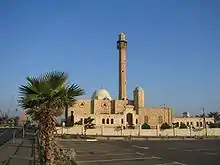El-Jazzar Mosque
The el-Jazzar Mosque (Arabic: مسجد الجزار, Masjid al-Jazzar; Hebrew: מסגד אל-ג'זאר, Misgad al-G'zar), also known as the White Mosque, is located on el-Jazzar Street inside the walls of the old city of Acre, overlooking the eastern Mediterranean Sea, and is named after the Ottoman Bosnian governor Ahmad Pasha el-Jazzar ("the Butcher").
| el-Jazzar Mosque | |
|---|---|
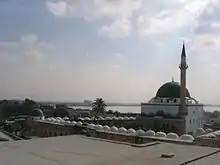 | |
| Religion | |
| Affiliation | Islam |
| Location | |
| Location | |
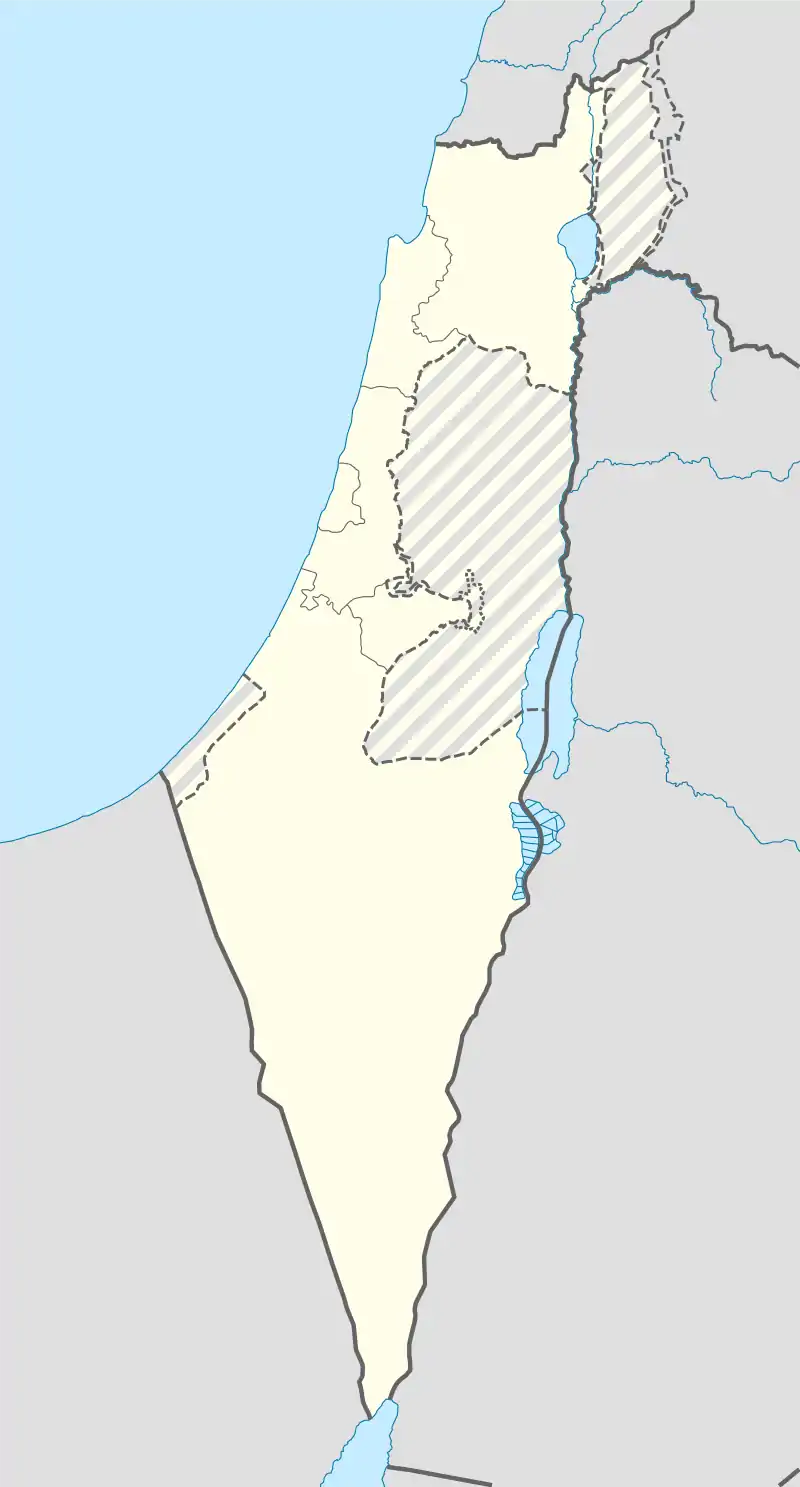 Shown within Israel | |
| Geographic coordinates | 32°55′21.74″N 35°4′13.13″E |
| Architecture | |
| Type | Mosque |
| Style | Ottoman |
| Founder | Jazzar Pasha |
| Completed | 1781 |
| Minaret(s) | 1 |
History
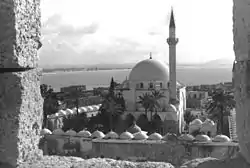
The el-Jazzar Mosque was the project of its namesake, Ahmad Pasha el-Jazzar, the Acre-based governor of the Sidon and Damascus provinces, who was famous for his impressive public works, and defeat of Napoleon Bonaparte at the Siege of Acre in 1799. El-Jazzar ordered the mosque's construction in 1781 and had it completed within the year.[1] Despite lacking architectural training, el-Jazzar was the architect of the mosque,[2][3] drawing up its plans and design,[2] and supervising its entire construction.[3][2] In addition to the mosque itself, the complex included an Islamic theological academy with student lodging, an Islamic court and a public library.[3] The mosque was built for religious purposes, but its grandiose size and additional functions were also intended by el-Jazzar to serve as a means of consolidating his political legitimacy as ruler of Syria.[4] He modeled the mosque on the mosques of Istanbul, the Ottoman capital.[3]
The el-Jazzar Mosque was built over former Muslim and Christian prayer houses and other Crusader buildings.[1] Building materials for the mosque, particularly its marble and granite components, were taken from the ancient ruins of Caesarea, Atlit and medieval Acre. El-Jazzar commissioned several Greek masons as the mosque's builders.[5] There is a tughra or monogram on a marble disc inside the gate, naming the ruling Sultan, his father, and bearing the legend "ever-victorious".
Adjacent to the mosque is a mausoleum and small graveyard containing the tombs of Jazzar Pasha and his adoptive son and successor, Sulayman Pasha, and their relatives.[6]
Architecture
The mosque is an excellent example of Ottoman architecture, which incorporated both Byzantine and Persian styles. Some of its fine features include the green dome and minaret, a green-domed sabil next to its steps (a kiosk, built by Sultan Abdul Hamid II, for dispensing chilled drinking water and beverages) and a large courtyard.[6]
The mosque, that is dominating Acre's skyline, was originally named Masjid al-Anwar (the "Great Mosque of Lights") and is also known as the White Mosque because of its once silvery-white dome that glittered at a great distance. The dome is now painted green.[1] The minaret has a winding staircase of 124 steps.[7]
Sha'r an-Nabi
The mosque houses the Sha'r an-Nabi, a hair (or lock of hair) from the beard of the Prophet Muhammad. The Sha'r an-Nabi used to be paraded through Acre on Eid al-Fitr, ending the fast of Ramadan, but is now only shown to the congregation.[7] The relic is kept inside the mosque in a glass cabinet placed at the women's upper floor gallery.[8][9]
Gallery
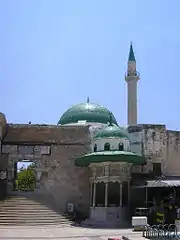 Entrance to the mosque, with the sabil to the right of the steps.
Entrance to the mosque, with the sabil to the right of the steps. Entrance to el-Jazzar Mosque
Entrance to el-Jazzar Mosque El-Jazzar Mosque Interior
El-Jazzar Mosque Interior Long distant view
Long distant view El-Jazzar Mosque
El-Jazzar Mosque_2008-01.jpg.webp) El-Jazzar Mosque
El-Jazzar Mosque
References
| Wikimedia Commons has media related to Al-Jazzar Mosque. |
- Archnet Archived 5 August 2011 at the Wayback Machine Jazzar Mosque.
- Philipp 2001, p. 58.
- Sharon 1997, p. 47.
- Philipp 2001, p. 59.
- Sharon 1997, p. 50.
- Mosque of Ahmed Jezzar Pasha Ullian, Robert. Wiley Publishing
- Elian J. Finbert (1956) Israel Hachette, p 177
- http://www.jta.org/1981/05/22/archive/the-al-jazzar-mosque-in-acre-built-in-1781
- http://www.fodors.com/world/africa-and-middle-east/israel/haifa-and-the-northern-coast/things-to-do/sights/reviews/al-jazzar-mosque-460314
